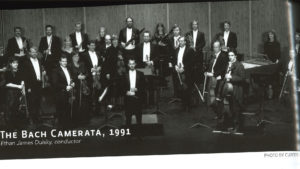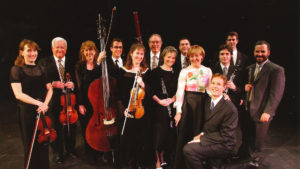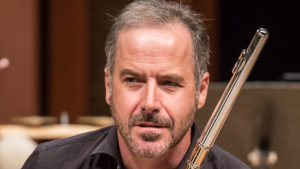Next year, Ludwig van Beethoven, perhaps the most famous of all classical music composers, would have been 250 years old. Which means it is a time for a celebration. Also celebrating a milestone birthday is Camerata Pacifica, a local chamber music ensemble formed thirty years ago by Artistic Director Adrian Spence. What, you ask, do they have in common?
To mark both anniversaries, Camerata Pacifica began a Why Beethoven? project last year. The two-year celebration concludes at the end of their just-started 2019-2020 season with a performance of the Beethoven String Quartet in B Flat Major, Op. 130 with its original ending. Last season concluded with the same quartet, but with its revised ending.
I recently spoke by phone with Spence about his original goals for Camerata Pacifica, where he sees the ensemble today and through it all I got insight into his views on classical music today and the role Los Angeles plays in its future.

How was Camerata Pacific carved a place for itself in the classical music world in Southern California?
What we’ve done much more generally is bring a mainstream audience into the 21st century with us. Our mission talks about affecting positively how people experience classical music. At the end of every season my goal is to make the audience more capable listeners than I had at the start of the season. I think we’ve done that. Over three decades this has become a well-honed audience. If you don’t want to come and lean in and listen, because I expect you to do that, don’t come. There are a whole bunch of other groups I can recommend to you.
What was your vision in 1989 and how does Camerata Pacifica today reflect what you envisioned?
I’m glad to say that we’re living the dream. You are a writer in the classical music business, you understand and this is no indictment of you personally, but no other industry writes so poorly about itself like the classical music industry. Tobacco does a better job and they kill people. I don’t think it is as bad as it was. This is the golden age. This is the second renaissance for classical music.

We’re immersed in this whole Beethoven notion, but we’re still presenting concerts by rules established in 1800 and the wheels are coming off that machine. The large paradigm institutions have to make massive corrections. Filling a 3,000 person concert hall is a problem, particularly for regional symphony orchestras or operas. Filling smaller halls is being lead by chamber music and it offers a broader range of repertoire. That’s what I’ve always wanted to be a part of. If you can’t listen to Toru Takemitsu, then you’re not hearing Beethoven. That’s been an assertion of ours for 30 years.
How important is the pairing of well-known composers with lesser-known composers in order to grow appreciation of classical music?
I think it is critical for the audience. In the latter half of the 20th century you had a small number of white males deciding who was going to be listened to and what was recorded and broadcast and that’s all collapsed. And that’s fabulous. The arrival of the iPod shuffle is brilliant. Young people are not defined by genre. They listen to what they listen to with an open mind. Classical music is always going to be a minority participation sport because it requires greater participation. We’re never going to get a market share of 95% – it will always be 1 or 2 percent. But that share will always be there. There are always smart people who want to think for themselves. Whether Millennials or Gen X or what you want to call it, you are going to have smart curious people. If you have smart, curious people they can be brought to our product. We are stewards of this art form and we, too, as audience members, should be handing it off to the next generation better than we received it. This is what I think about every day.

You have a unique way of looking at what an audience is and/or should be.
I’m not interested in the music lover. A music lover has fairly rigid ideas of with they think is good or bad music. They are usually thinking of 18th or 19th century work written in a linear manner. What I’m interested in are the intellectually curious and it’s going to be Beethoven and George Crumb and Huang Ruo and they will ask “Why?” I want to reach those people. I believe there is a massive audience of intellectually curious who don’t come because they think of it as dusty or boring. Why the hell you’d drop 50 or 100 bucks on that I don’t know.
How would you describe the state of the arts in Los Angeles as we move into the 2020s?
Nobody has asked me that question before. I think Los Angeles is where it is at. I think the LA Philharmonic is doing a superb leadership job. The growing work done, particularly by Esa-Pekka Salonen, that was superb work that has helped create an audience whether happily or unhappily, they expect to be presented with new music on a regular basis.
I think the future of classical music is looking west into the Pacific. And I think Los Angeles and Southern California is poised to do that. Even in the time that we’ve been performing here there’s been an explosion of chamber music groups. You look at Yuval Sharon’s The Industry, some of the off-stage stuff LA Opera is doing – which is critical, Green Umbrella, Jacaradana, we’re trying to work together and show audiences what’s out there and present it collaboratively.
When you see so much going on – good ideas and bad ideas – whether all these things survive, that’s the sign of a healthy artistic musical environment. Because that’s what you want – constant new ideas and most of them, by the nature of being, aren’t going to work. The more you have, the more that will work. That’s just simple. I think in Southern California we’re seeing that, which is exciting.
All photos courtesy of Camerata Pacifica











